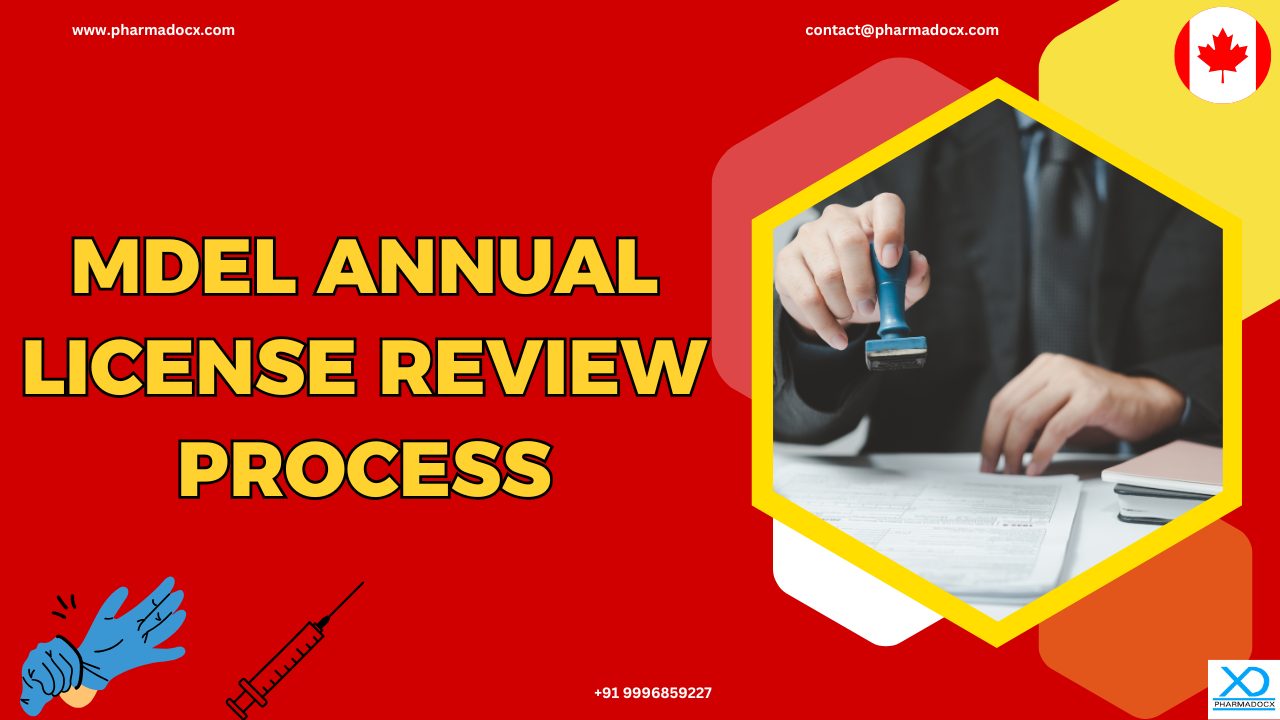To continue operating under an active MDEL, holders must apply for an annual license review (ALR). This renewal is mandated under Section 46.1 of the Canadian Medical Devices Regulations. In this blog, we have discussed the MDEL annual license review process.
What is Health Canada MDEL?
To legally market Class I medical devices in Canada, medical device establishment licence (MDEL) is required. Class I medical devices pose minimal potential risk to patients and users. These medical devices are subject to fewer regulatory controls as opposed to those belonging to higher-risk categories. However, Class I medical devices are required to comply with essential safety, effectiveness, and quality standards outlined in the regulations.
Who needs an MDEL?
- Manufacturers: Manufacturers of Class I medical devices need an MDEL. However, manufacturers may opt to partner with a licensed importer and list their device under the importer’s MDEL. This way manufacturers of Class I medical devices can avoid paying the MDEL application fees.
- Importers and distributors: All importers and distributors must have an MDEL, regardless of the medical device class.
An MDEL is a permit for the establishment, not a product approval for all classes of medical devices. It is an approval for Class I medical devices only. A separate Medical Device Licence (MDL) is required for Class II, III, and IV devices.
What are the requirements for issuing an MDEL?
The requirements for securing the MDEL are less rigorous. The importers and distributors of Class I medical devices need to have written procedures for complaint handling and device recalls to secure the MDEL. The importers and distributors need to mandatorily have a valid MDEL.
Moreover, all Class I medical devices are required to comply with labelling requirements of the Canadian MDR. The labels should clearly provide all essential information. Additionally, the label should clearly indicate the intended use of the device.
Furthermore, a formal quality management system (QMS), such as medical device single audit program (MDSAP) certification, is not strictly mandatory for Class I devices. However, manufacturers are strongly encouraged to implement a robust QMS to ensure product safety and effectiveness.
Additionally, manufacturers are required to compile and maintain proper documentation evidencing the safety and effectiveness of their Class I devices. The information should include design specifications, risk assessments, and testing data.
What is the MDEL annual license review?
The MDEL annual license review (ALR) is a yearly renewal process for companies that manufacture, import, or distribute medical devices for human use in Canada. Health Canada oversees the ALR process. This review process ensures that MDEL holders remain consistently compliant with the Canadian Medical Devices Regulations (MDR).
Key insights into the MDEL annual license review
- Purpose: The ALR verifies that MDEL holders are compliant with the latest Health Canada regulations and have provided up-to-date information to Health Canada.
- Application deadline: The deadline to submit the Annual Licence Review (ALR) application is the April 1st of every year.
- Annual package: Health Canada sends an ALR application package to all active MDEL holders starting in December.
- Attestation: A senior official must attest that the required procedures are in place, including those for handling complaints, recalls, and incident reporting.
- List of suppliers: Health Canada is proposing to make the submission of a list of suppliers mandatory as part of the annual review.
- Updated information: The application requires current information on the establishment, such as the name, address, and the types of devices handled, to be submitted.
What you need to submit as part of MDEL annual license review process?
Your MDEL ALR application package should include the following:
- A completed ALR form
- Confirmation of current licence details
- Any updates to contact information
- Declaration of intent to continue or discontinue operations
Note: Health Canada sends the ALR package to all active MDEL holders in late December. Notably, if you do not receive it by mid-January, you should contact them regarding the package.
MDEL annual license review submission process
- Electronic submission: MDEL annual license review submission has to be sent electronically to Health Canada at their official email id.
- Payment: An invoice for the annual fee is issued after the application is received and screened. Notably, non-payment will result in cancellation of the MDEL.
Application processing timeline
- Health Canada processes MDEL annual license review applications in the order they receive the applications.
- 120 calendar days are usually required to process an application.
What happens if you do not apply?
Failure to submit the MDEL annual license review application by April 1st results in automatic licence cancellation.
Consequences of non-compliance
- License cancellation: If the MDEL ALR application is not submitted or license fees are not paid for by the deadline, the MDEL will be cancelled. The company can no longer legally manufacture, import, or sell medical devices in Canada.
- Deficiencies: If the application has deficiencies, the MDEL holder is given a timeframe to correct them. Failure to provide a complete response will lead to rejection of the application and cancellation of the MDEL.
MDEL ALR compliance checklist
- Pre-submission preparation: Set internal reminders for the April 1st deadline. Verify receipt of ALR package from Health Canada, which is usually sent in December to avoid missed communications
- Documentation review: Use the current year’s ALR form not previous versions. Confirm MDEL number and legal entity name. Additionally, review and update establishment address, senior official contact information, importer/distributor list. Moreover, check site activities, such as manufacturing, importing, selling.
- MDEL ALR fees: Annual fee for MDEL ALR is invoiced regardless of changes to your licence. The fee is adjusted yearly based on the Consumer Price Index (CPI). Hence, prior to payment, confirm annual fee amount, which is adjusted by CPI. If applicable, register as a small business prior to submitting ALR. Notably, ensure small business registration confirmation is on file.
- Submission process: Complete and sign ALR form. Include declaration of intent (to continue or discontinue operations).Notably, submit via email only. Importantly, save submission confirmation and timestamp.
- Post-submission and audit readiness: Track Health Canada’s response to MDEL annual license review application, which is within 120 calendar days. Then, archive ALR submission and correspondence in QMS. Update internal SOPs and training logs, if any changes were made. Finally, flag next ALR cycle in compliance calendar.
Small business consideration for MDEL ALR
Health Canada offers fee reductions to qualifying small businesses to reduce financial burden and encourage regulatory participation. This fee reduction applies to establishment licence fees, including ALR, right to sell fees, and pre-market evaluation submissions.
- Eligibility: Businesses with fewer than 100 employees or $30K–$5M CAD in revenue are considered small businesses. This includes global operations not just Canadian entities. All employees and revenue across geographies and product lines are considered. The businesses must register for small business status before applying for this consideration.
- Available fee reductions: Once approved as a small business, the business becomes eligible for multiple fee reductions. First, 25% reduction on MDEL annual license review fees. Second, 25% reduction on right to sell fees. Third, 50% reduction on pre-market evaluation fees. Fourth, first pre-market evaluation submission is free.
- Application steps: Firstly, complete the small business declaration form. Secondly, submit via Health Canada’s online portal or email. Third, await confirmation before submitting your ALR.
Notably, you must apply for small business status before submitting your ALR. Or else, you will be invoiced the full fee. Notably, retroactive adjustments are not permitted.
5 Common pitfalls in the MDEL annual license review application process
- Missing the April 1st deadline. Health Canada does not offer grace periods. Late submissions result in automatic licence cancellation, thereby requiring a full reapplication.
- Failure to update establishment information.
- Claiming the 25% small business fee reduction without pre-registering as a small business leads to rejection.
- Submitting incomplete or incorrect forms. Notably, Health Canada only accepts the current year’s ALR form.
- ALR packages are sent via email in December. Ignoring email communications will lead to use of wrong form.
Need help with MDEL annual license review application process? We at Pharmadocx Consultants have extensive knowledge of the Canadian medical device regulations and requirements. Drop an email at [email protected] or call/Whatsapp on 9996859227 and our team will be more than happy to help.





